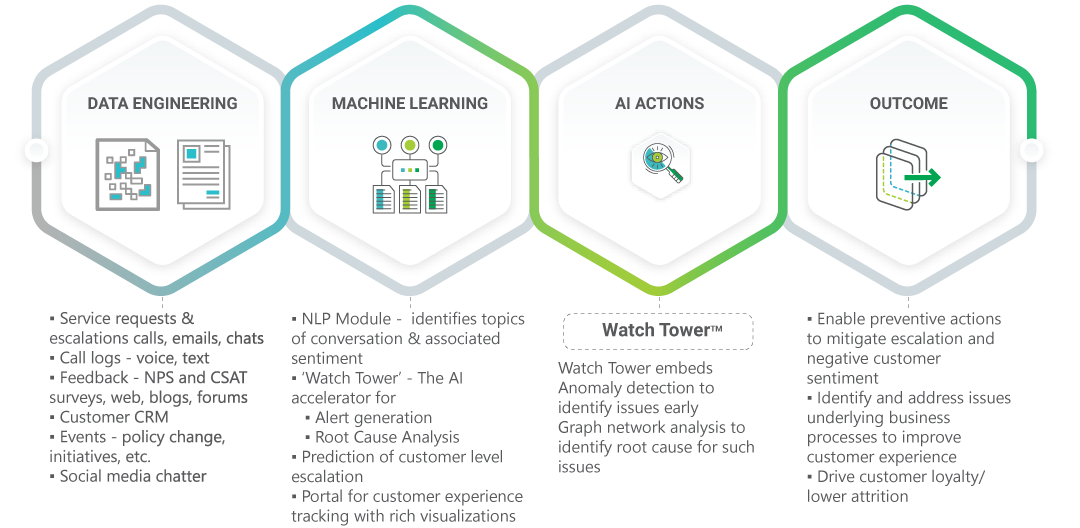Artificial intelligence is playing a key role in the management of financial services. As AI is powering the digital transformation in the present era, it has also reshaped the financial sector. AI is one of the most sought-after innovations, and with the help of this powerful tool, financial companies are achieving desirable business growth.

The incorporation of digital transformation in financial services has brought a transition in the interaction with finances. The deployment of artificial intelligence technologies in financial institutions has reshaped the world of banking and is also changing its interface. With the application of artificial intelligence in financial services
, customers have gained better access to how they spend, save, or invest their money. With the help of AI chatbots, customers can find assistance to carry out simple operations round the clock, like checking out the updates of transactions through self-service.
Hence, the use of AI technologies has streamlined processes, optimized the portfolios, decreased the risks and underwriting of loans, and improved the customer experience by providing real-time access to various services with the help of AI chatbots. Hence, artificial intelligence has improved the quality and quantitative aspects of financial marketing.
From risk-free management to detection of fraud, management of finances, and task automation, artificial intelligence has revolutionized the finance department’s work process. It has accelerated technological advancement, customer support, and experience and streamlined the entire process of management. The implementation of AI technologies has benefited the finance industry in several ways. Here is a list of five applications of Artificial Intelligence in finance.
1) Enhancing Financial Monitoring
The financial sector is highly exposed to the risk of various cybercrimes. Any data leakage or breaches can drive the entire finance industry to a big loss, and it can collapse in no time. Since the finance industry involves a lot of money, they can incur huge losses due to such risks.
Hence, in this industry, a vigilant monitoring system is an essential requirement. A monitoring system that is powered with machine learning algorithms can enhance network security efficiently. Machine learning capabilities are evolving continuously, and the data scientists are also working on training the systems to flag the various money laundering methods via financial monitoring.
2) Making Investment Predictions
With the various subsets of artificial intelligence like machine learning, computer vision, and the other Data Analytics tool, it can be used to predict data patterns, which can enhance the decision-making process. The analysis of historical data by AI-powered tools can help to get better market insights and identify the market statistics and strategies. With this, the companies can perform better in the market and make informed decisions in a shorter time than traditional investment models.
3) Maximizing Process Automation
Automation being one of the key tools of artificial intelligence has augmented the capabilities of the human workforce. It is assisting the human agents and is helping to save time and labor. The financial sector is adapting AI applications like chatbots, virtual assistants, and automation. With this, the manual work is being assisted efficiently, and it is also decreasing the inefficiency in the system by automating repetitive tasks via intelligent process automation. This has also increased the process of delivering better customer service by accessing data, interpreting behavior, and recognizing patterns.
4) Ensuring Safe Transaction
Artificial intelligence is being used exponentially to flag transactional frauds. It analyzes the vast set of data at each point, which is impossible to be scrutinized by human vision. This helps to reduce the number of false rejections and also increases the accuracy of real-time approvals. The AI system uses the data of previous client interaction and transaction history to analyze the pattern of data and to identify the loopholes.
For the financial sector, detecting suspicious behavior and prevention, real-time fraud is important. Artificial intelligence is equipped with the requisite technologies to prevent such mishappenings.
5) Insisting On Better Decision-Making
Like any other sector, the financial industry needs to improve its decision-making strategies. With the help of artificial intelligence and machine learning to perform a streamlined analysis of both the structured and unstructured data, it is helping the industry to make real-time and effective decisions. It provides an informative insight into better marketing strategies for improved performance. Hence, AI acts as an effective marketing tool that will help the system administrators make better decisions to improve the functionality of the entire finance sector.
To Conclude:
With the help of AI-powered tools in the financial sector, it helps the industries get valuable insights from data sets for better business profitability and scalability. With efficient data management, advanced data security, and better customer interaction and support service, the application of AI in the finance sector has dynamically transformed the potential of this industry.
